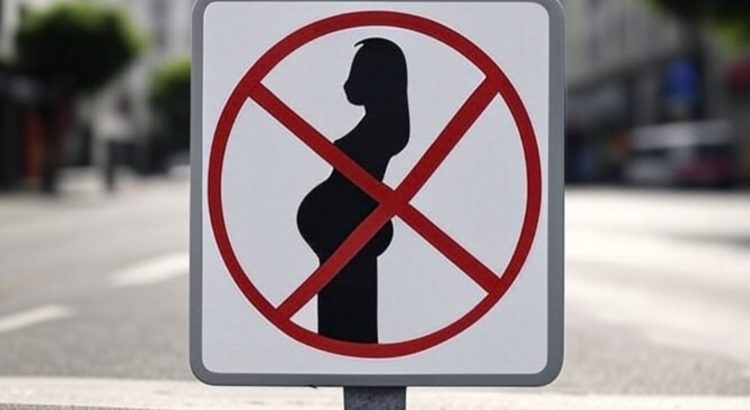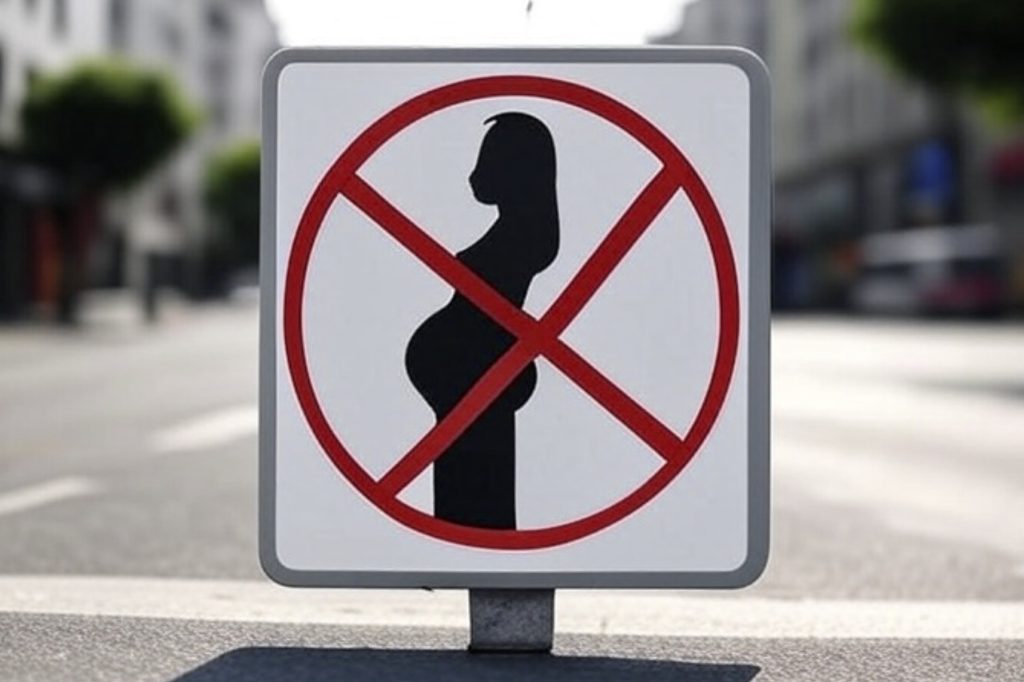
Careful analysis of loss after covid vaccines
Dr Clare Craig 26th June 2025
As of today pregnant women in the UK will no longer be recommended a covid vaccine. The autumn 2025 covid vaccine campaign has begun but today is also the day the UKHSA have chosen to release a new advert promoting covid vaccines in pregnancy.
In the meantime, A major new study offers the clearest signal yet that covid vaccination during early pregnancy may carry risks that were previously missed due to flawed methodologies in earlier research. This study demonstrates that standard pharmacovigilance practices may miss delayed or uncommon adverse events.
Why Previous Studies Fell Short
Until now, most studies failed on at least four key counts:
- Ignoring the Early Risk Period
Most studies ignored the first trimester. Those that did compared apples and oranges. Failure to acknowledge that the most dangerous period for pregnancy loss is early on. Women still pregnant at say week 10, have by definition survived that period and their risk will be lower than a control group which started counting from an earlier week. - The Healthy Vaccinee Effect
The women who choose to take a vaccine in pregnancy have lower risk factors for pregnancy loss because of their socioeconomic and health status. If a control group draws from the population as a whole the higher baseline rate can hide issues in the vaccinated cohort. - Short Follow-up Periods
To understand the full risk the entire pregnancy should be considered not just a period of a few weeks after the injection. Most studies only looked up to 20 weeks of pregnancy. - Ignoring some types of pregnancy loss
Many studies separate out miscarriages (spontaneous abortions) from induced procedures which include abortions and partial miscarriages. By excluding these the actual miscarriage rate can be misrepresented and abortions for fetal anomalies can be excluded.
Key Finding from the New Study:
Women vaccinated with an mRNA covid vaccine during gestational weeks 8–13 had nearly 4 additional fetal losses per 100 pregnancies compared to historical overall rates (13 observed vs. 9 expected).
If the women had had the same risk of fetal loss as those given influenza vaccines there would have been over 100,000 fewer years of life lost in Israel.
Crucially, most of these losses occurred after week 14, well beyond the typical observation window used in earlier studies.
No such increase was seen in women who received influenza vaccines during pregnancy – in fact, their outcomes were consistently better than historical averages, reflecting the healthy vaccinee effect.
The latest paper is based on medical records from 26% of the Israeli population. In total over 200,000 pregnancies were included. The historical baseline was based on 2016-2018 data and validated with 2018-2019 data. This enabled contemporary comparisons of women who chose influenza or covid vaccines from March 2020 to February 2022. Importantly, no impact of covid positive tests was seen on outcomes.
As expected women given influenza vaccines had a lower risk of fetal loss than the historic baseline at every week of gestation. This was not true for the covid vaccinated.
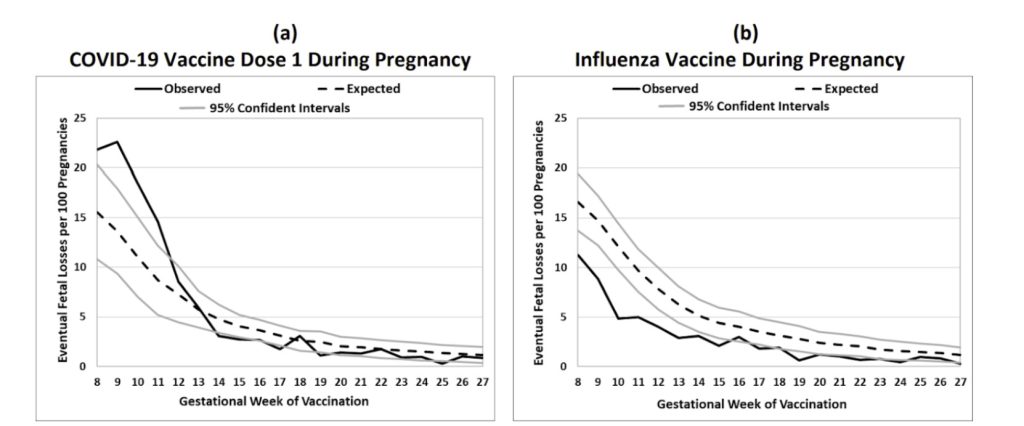
Figure 1: Fetal losses per 100 pregnancies by gestational week of vaccination in those taking covid vaccines and those taking influenza vaccines in pregnancy. Dotted line shows average for historical cohorts with historical confidence intervals in grey.
For women injected with a covid vaccine in the first trimester the risk was increased by 3.9 per 100 pregnancies over the historic level. Importantly, the extra losses occurred not in the first trimester but in the second or even third. Yet again we see how a time lag between injection and an adverse event can blind people to a serious problem.
Compared to the historic baseline an extra 3 in every 100 women who took a first trimester covid vaccine experienced a fetal loss after 14 weeks gestation. The authors describe how these late fetal losses could be due to “stillbirths and spontaneous or therapeutic abortions driven by biological mechanisms and medical reasons“ because elective abortions of healthy fetuses in Israel beyond 14 weeks are very rare and they are almost unheard of after 25 weeks. Data from England showed a statistically significant rise in abortions for fetal anomalies in March to May 2021. It would be interesting to investigate whether the risk differs in early rollout to later rollout in Israel too.
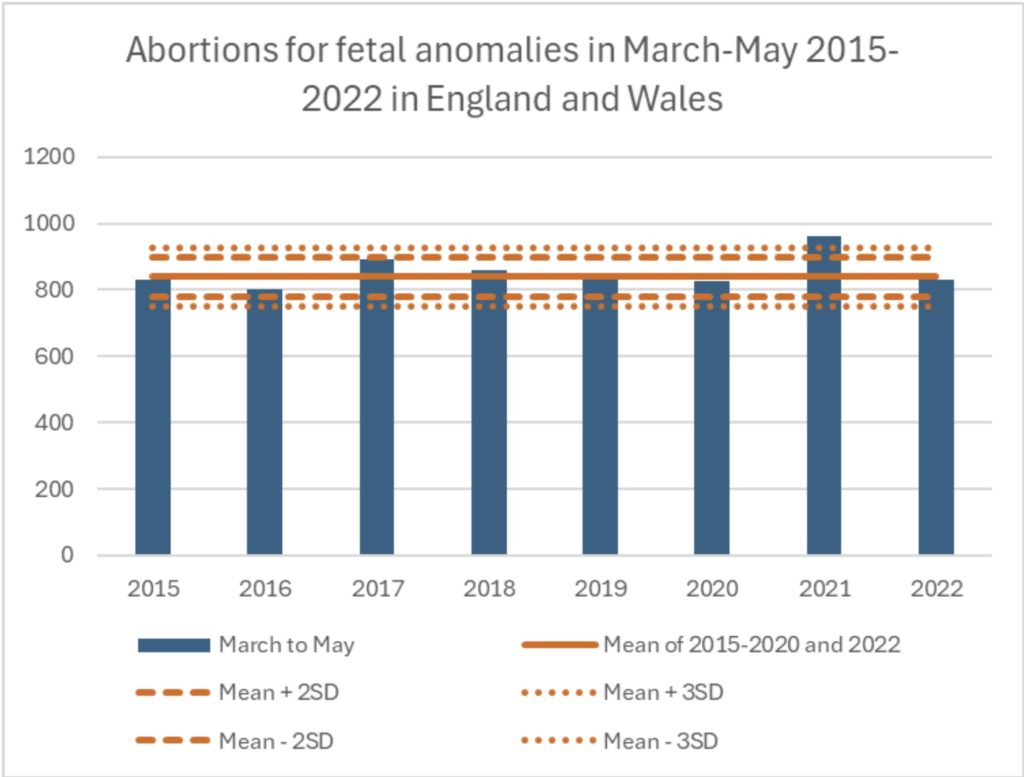
Figure 2: Fifteen percent rise in abortions for fetal anomalies in March to May.
Overall, the number of women who were vaccinated in the first trimester was small and the impact was spread out over many weeks of their subsequent pregnancies. The total number of losses was not huge and could easily have been dismissed as random variation when not looked for in this careful way.
What if we compare the covid vaccinated to the influenza vaccinated?
Comparing the covid vaccinated to historical baseline is comparing apples and oranges. Women who chose to be vaccinated have by definition a lower risk than women who do not. Is there anything we can do to account for that?
The authors of the study included a comparison for women injected before pregnancy. Women who had two doses before pregnancy had even better outcomes than women who had seasonal influenza vaccines before pregnancy. Given that comparison, it would be reasonable to compare women vaccinated during pregnancy with either covid or influenza vaccines. In that way the healthy vaccinee effect can be accounted for. The fact that losses that occurred in the first trimester in the covid vaccinated were lower than expected levels despite vaccination shows that this healthy vaccinee effect is real.
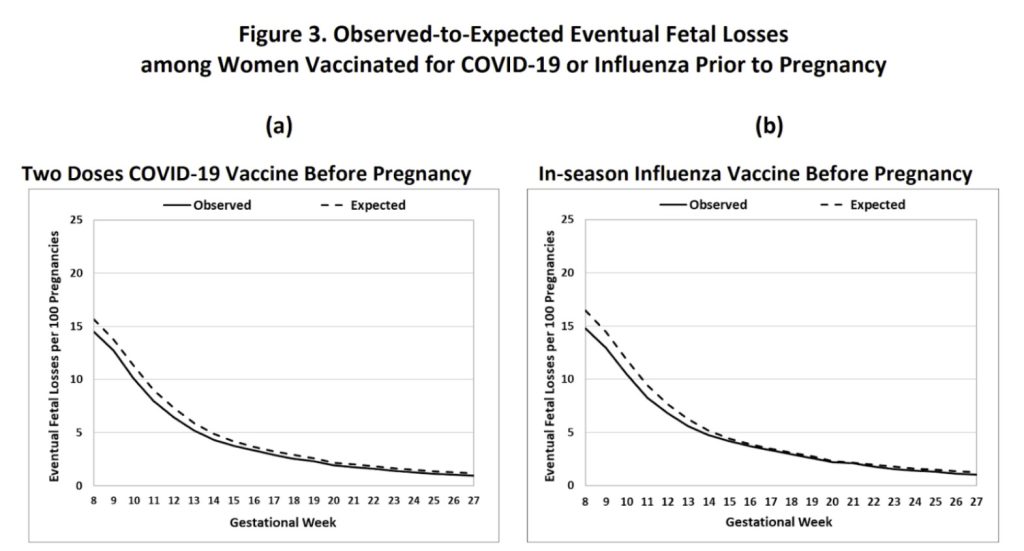
Figure 3: Percentage of pregnancies ending in fetal loss by gestational week in women who took covid vaccines or influenza vaccines before pregnancy. Dotted line shows historical average.
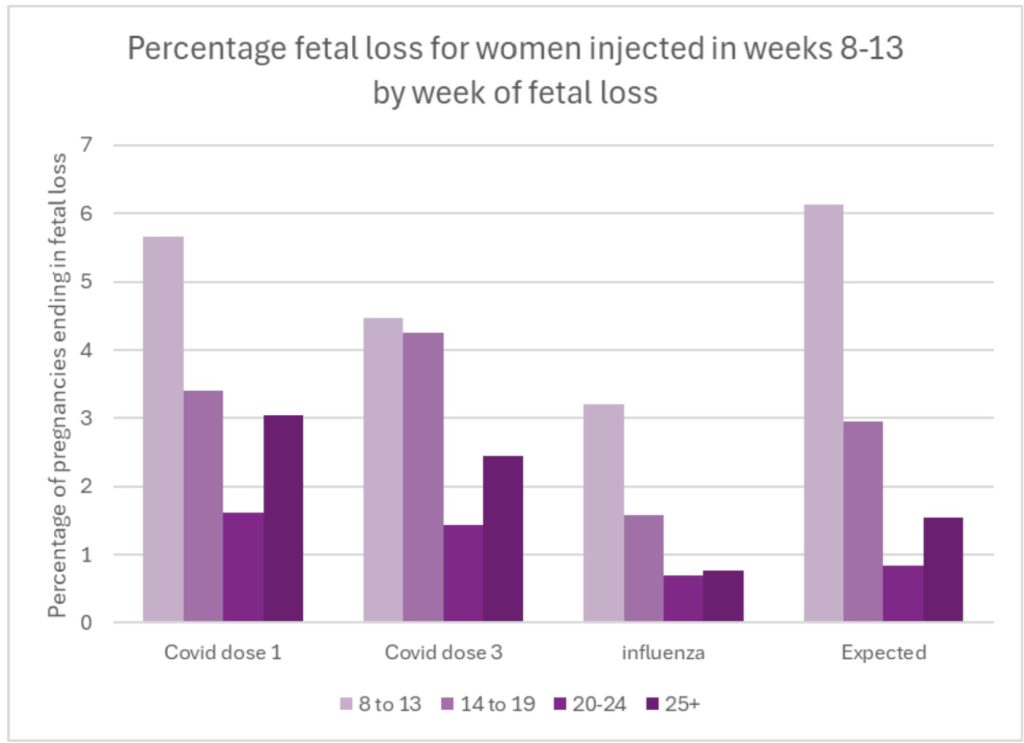
Figure 4: Percentage of pregnancies ending in fetal loss for women injected in the first trimester. Each bar represents the gestational weeks when the fetal loss occurred.
When using the influenza rates as a baseline there are excess losses that occur in the first trimester and at every other stage of pregnancy. The covid 1 group almost all had a second dose during that pregnancy. There is a clear dose response relationship here with the covid dose 3 group, who had one dose during pregnancy, having lower rates at almost every stage of pregnancy.
If we used influenza vaccination loss rates as a control then for the whole study there were 341 additional fetal losses in the covid vaccination group. 38% of these losses were for women injected after 14 weeks of pregnancy simply because most women avoided injection in the first trimester. 80% of the losses (from any time of injection) occurred after 14 weeks of pregnancy.
| Week of fetal loss | Difference in percentage of pregnancies ending in loss for Covid dose 1 compared to influenza vaccine | Difference in percentage of pregnancies ending in loss for Covid dose 3 compared to influenza vaccine | |
| Women injected 8-13 weeks | 8 to 13 | 2.4 | 1.3 |
| 14 to 19 | 1.8 | 2.7 | |
| 20 to 24 | 0.9 | 0.7 | |
| 25 or later | 2.3 | 1.7 | |
| Women injected after 14 weeks | 14 onwards | 0.4 | 0.6 |
Table 1: Difference in percentage of pregnancies ending in fetal loss for women taking covid vaccines compared to women taking influenza vaccines by week of fetal loss.
Scaling the results to Israel’s total population, an estimated 1,313 additional fetal losses in Israel may have occurred due to covid vaccination in pregnancy. With an average life expectancy of ~82 years, that equates to over 100,000 years of life lost.
As this represents only 26% of the Israeli population we can scale up from here to estimate that a total of 1313 Israeli women had an additional fetal loss in the covid vaccinated group assuming their baseline would have been similar to the influenza group. Given a life expectancy of 82.7 years that would equate to 108,615 years of life lost.
If we assumed a similar timing for vaccine uptake in England then of the more than 327,000 women injected during pregnancy there would have been an excess loss of 4,800 fetuses or around 400,000 years of life lost. By the end of March 2022, there had been 30,000 pregnant Scottish women vaccinated, which based on the same assumptions, would have seen an excess of 443 fetal losses a further 36,000 years of life lost. The caveats are that the influenza baseline might be inaccurate and more refined data matching by the week of gestation when vaccinated would be more accurate.
| Number of women vaccinated during pregnancy | |
| December 2020 | unknown |
| January 2021-June 2022 | 233,403 |
| June-Sept 2022 | unknown |
| Sept 2022-May 2023 | >47,000 |
| Sept 2023-May 2024 | 47,397 |
| Total | >327,800 |
Table 2: Reported covid vaccinations of women during pregnancy in England based on UKHSA data
Notably, 11.7% of women vaccinated in England as late as spring 2024 during pregnancy were vaccinated in the first trimester.
Injecting novel products during pregnancy was always reckless. Failing to carry out trials beforehand was more reckless still. Failing to ensure close follow up of those initially vaccinated once rollout began compounded the recklessness. Failing to use proper controls in observational studies that followed was wilful blindness.
